Telltale tells of its next tale: The Wolf Among Us preview
How The Walking Dead developer stays fresh with Fables.
Telltale Games has a lot to live up to. Once a niche studio content with making a small subset of gamers happy with its whimsical take on Sam & Max and Back to the Future, the small studio got thrust into the limelight after its critically acclaimed episodic take on Robert Kirkman's The Walking Dead won loads of "Game of the Year" awards (including taking top honours at the VGAs, a silly, albeit widespread awards show that typically only recognises triple-A titles).
Beyond simply being the follow-up to what many, including myself, consider to be a masterclass of merging interactive storytelling with a somewhat prescribed narrative, the San Francisco-based studio's next project, The Wolf Among Us, is a prequel to its source material, Bill Willingham's Fables series of comics. This means that the developer has to not only spin a good yarn that gives players agency, but needs to make it consistent with over a hundred issues of Willingham's comic. No pressure.
This is especially challenging for Telltale as The Wolf Among Us casts players as a central figure in the series, Bigby Wolf, of "the big bad" fame. This is a major switch from The Walking Dead, which primarily featured an entirely new cast with minimal contact from series' regulars. Furthermore, The Walking Dead's lead, Lee Everett, was never in a position of power, so guiding his fate to a place of dramatic import couldn't have been as difficult for Telltale.
"It was easier in The Walking Dead for us because Lee was sort of our own character that we could do anything with," said The Wolf Among Us head writer Pierre Shorette. "With The Wolf Among Us we're picking up Bigby Wolf, who's a character not only in his own fables, but in the book Fables."
With a hundred plus issues of lore to stay true to, Telltale's task hasn't been easy, but Shorette seems confident about how Telltale's toed this line. "Bill [Willingham] played through the game a few weeks ago, and he had a notepad when he went in there to write notes about inconsistencies and things that may not line up with what he's doing or just character things, and from what I hear at the end of the demo he hadn't written anything."
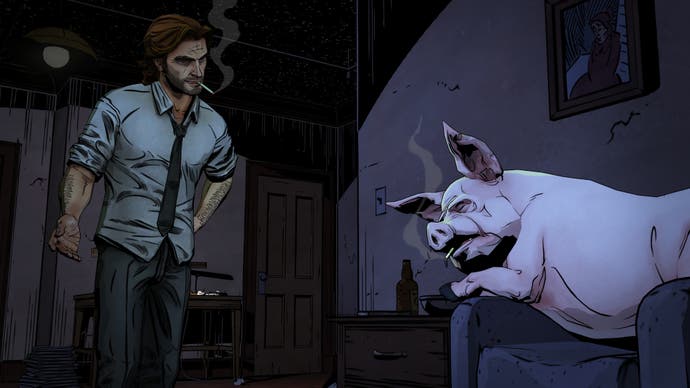
This war between free will and destiny is not only a challenge for Telltale in creating a prequel, but it seems to be a central theme of the Fables universe as well. I must confess that I've not read the source material, but based on the little I glean from the demo, it seems like the focal point for many of the characters' inner turmoil is their struggle between who their tale casts them as and who they want to be.
That's another key difference between The Walking Dead and The Wolf Among Us: in the former you're discovering how the world works with the protagonist, whereas this time around you're being introduced to a rich fantasy universe that is commonplace for the cast. "The idea that all that has to be brought to the table for people and that a good chunk of our audience is going to know all of this going in is definitely a balance that we have to strike," says Shorette. "I think what we're finding is that by having a character show up that people have never met, if we approach it in an interesting way, they'll say 'oh, that's interesting. I've never seen this character before.' And for people who are Fables-aware, ultimately they see that same scene and it just turns into the scene form the 80s sitcom where the audience claps."
Being in the former camp of a Fables neophyte, I have to say I'm quite impressed by the brief 15 minute demo. Set in mid 80s New York, The Wolf Among Us begins with Bigby Wolf, Sheriff of Fabletown, checking in on his fantasy-based brethren when he finds himself having to lay down the law with Toad, a three-foot amphibian slumlord who dresses like a three-foot human slumlord, sporting a wife beater and sweatpants. "Where's your glamour?" Bigby asks, obviously irritated.
You see, these not-quite-human fairy tale rejects are supposed to blend in with regular folk, not unlike the witches and wizards in Harry Potter. It's against the law to show one's true form, and even in New York a dwarf-sized talking toad would raise an eyebrow or two. "You don't want to be sent to the Farm, do you?" Bigby asks.
As it turns out, glamour, like health insurance in the states, isn't easily affordable. Not to a blue collar green guy with a family to support. He says he'll get more glamour soon and dawn his disguise. While I remain empathetic, but firm, we're interrupted by a domestic dispute upstairs. I head on up to sort things out only to find a large, bald, bearded man beating on a slim little waif of a woman who appears to be in her early 20s.
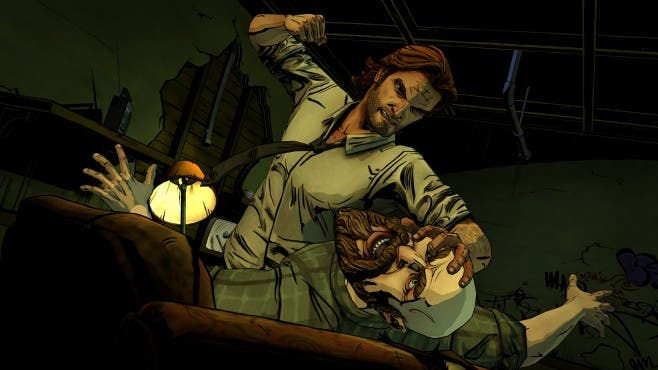
The enraged - and possibly inebriated - man turns his attention towards Bigby and the two get in a fight that's more Coen Brothers than Brothers Grimm as the two smash the stuffing out of one another. Input remains largely unchanged from The Walking Dead, but there's a little more room for deviation as you can decide which piece of scenery to slam your opponent's head into. Co-director Nick Herman later informs me that there are only two places where I could actually lose the fight. "We like to just let Bigby get the s*** kicked out of him a bit and move on," he says. Just like The Walking Dead, this is a game about choices, not reflexes.
Once the brute is out of commission I start inquiring about the situation of the little lady, who's remaining tight-lipped about the whole ordeal. I find out she just met her attacker that night and he goes by the name of Woodsman, the very same one who slays the Big Bad Wolf in Little Red Riding Hood. We have a history.
At any rate, Woodsman comes to again and the tussle continues as both parties wrestle until they fall out of a window and tumble onto a car a few stories below. Due to their superhuman strength, they're still alive, albeit worse for wear. Woodsman is still beating on poor Bigby, determined to get him to show his true form, but just before things get to that point the woman strikes this would-be lumberjack in the back of the head with his axe. He collapses and the demo ends.
In terms of its stylised cel-shaded look and mechanics, The Wolf Among Us feels a lot like The Walking Dead, but it's narratively quite different. While Lee was very slightly famous after allegedly murdering a politician, Bigby is basically a celebrity in his circle. "He's the sheriff of Fabletown. He has his reputation as the Big Bad Wolf. He walks into a room and people know who he is and he might not necessarily know who they are," explains Shorette. "He is a guy who people have preconceived notions of. It's something that he's constantly playing against in terms of how people feel about him and what he's able to get from people... And he's a powerful guy, so it is definitely a different take. So I think that's why this game should feel different than The Walking Dead."
Another change, less apparent in the demo, is that there will be more branching scenes, even if the overall narrative thrust will remain as funnelled as The Walking Dead's. "One idea we're playing with is that time actually sort of matters," explains Herman. "You can only be in one place at one time, and a lot of people need your help and you sometimes have to choose between relationships or the case. So we're playing with that a little bit, but we still have a story we want to tell. We know we want to get somewhere, but like The Walking Dead, I think we're more excited about the journey and the player owning that."
"It doesn't necessarily even feel super important in the moment, but that's sort of how life is," Shorette adds. "The day you decide to get in a car 30 seconds sooner you might not have gotten in a car accident. It's just how life is and the world is going to go on without you. So whether you go to one place or another, things are going to happen at the place where you're not."
"We have a whiteboard at work [showing] 'these are the things that are happening concurrently even if you're not there,'" Herman explains. "We were trying to make all that make sense... Even if it doesn't feel like 'oh my god, the game is so different,' it can be."
One thing I notice in the demo is that the by default, the prompts to tell you when you've made a game-changing decision are on. This was the case in The Walking Dead as well, but I wisely opted to disable them before I started that game as I personally find them pandering and distracting as they essentially shout in your ear "hey! That was a choice that mattered!" It's almost like a behind-the-scenes "this is how our game works" feature you'd expect as an extra on a DVD, rather than an interruption one would expect in the initial experience. So why are these the default anyway?
"You know why we do it? Because people love it," Herman laughs. "I think a lot of people [at] internal were super adverse to it and we did it in front of people and they flip out. They love it. And so we put it in the game."
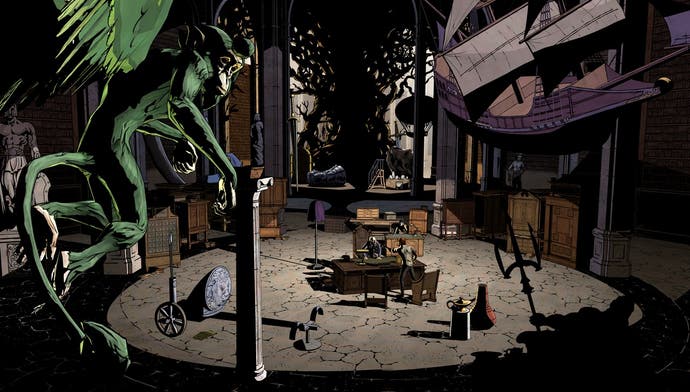
"There's a reason there's an option to turn it off," Shorette adds. "It's a stop-gap in terms of the narrative. If we didn't sell them on the acting or the voice-over or in the writing, there's a way for you to understand that there are ramifications. Is it the most elegant thing in the universe? No. But that said, it is effective."
"I think it was important in The Walking Dead for people to understand what we're doing. Maybe moving forward it's less so," Herman says. "But I think now at this point people are so attached to seeing it that they react a certain way when they see that."
"The first time I played The Walking Dead and the first time I remember that came up was on Hershel's farm when I might have lied," Shorette recalls. "Seeing that as a writer, it's such an expositional tool that my gut reaction is to be averse to it. I can't argue against the feeling I have of dread when that moment happened. I think getting that emotional response is worth it."
"Initially we did like a 50/50 split in playtests and we got better scores from people who had it on," Herman continues, adding that it's essentially "to reinforce that dialogue is gameplay."
Fair enough. I guess I'm an outlier then, but I think it's a more fluid experience without the prompts and would highly recommend people try it with them disabled. Just my two cents, anyway.
Prompts or not, based on its opening scene The Wolf Among Us feels like a worthy successor to The Walking Dead, and it demonstrates Telltale's willingness to constantly re-evaluate its storytelling process, even if the changes aren't outwardly obvious. Less immediately welcoming, but more darkly intriguing, The Wolf Among Us seems like it's got a winning shot of living up to its hype.
Penning an interactive prequel to Willingham's labyrinthine lore sounds like a Herculean task, but Telltale rises to the challenge like and is eager to the thought of turning people on to its source material. "This is just the beginning," says Shorette. "How often do you get to make a video game that already has a 'sequel' built in that's 100 plus issues long? That's really awesome that Bill and DC gave us that opportunity."
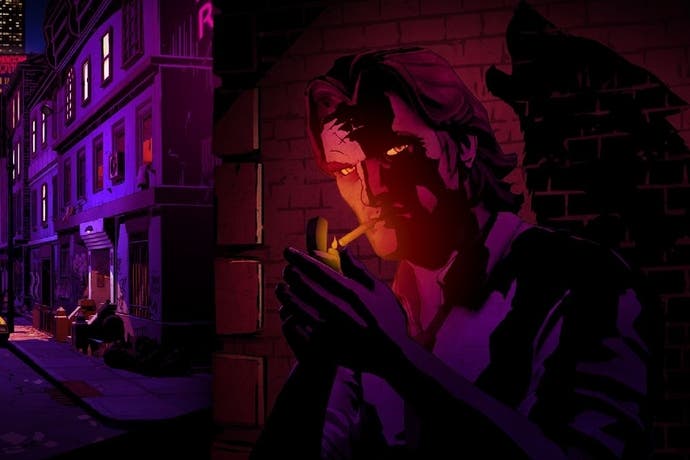


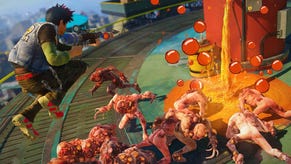
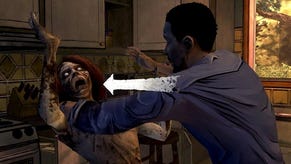
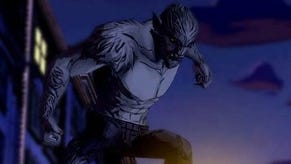

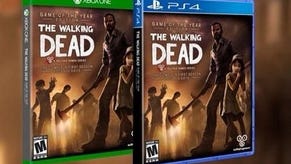
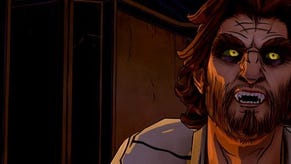
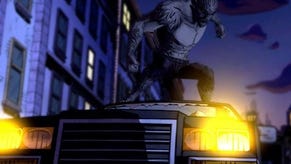
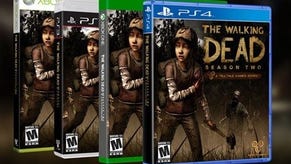



.png?width=291&height=164&fit=crop&quality=80&format=jpg&auto=webp)



